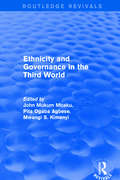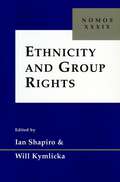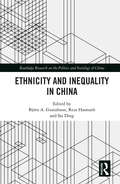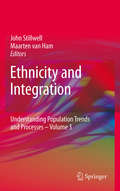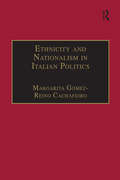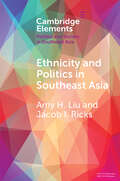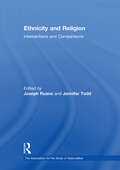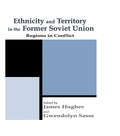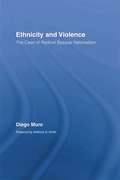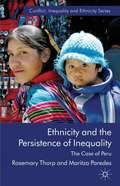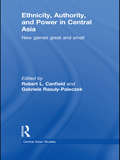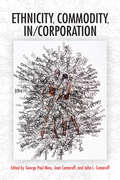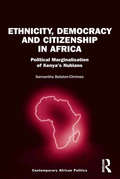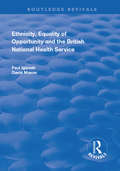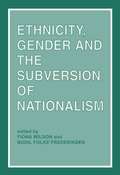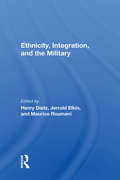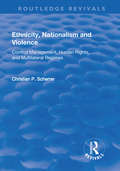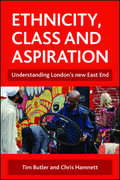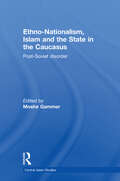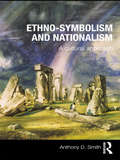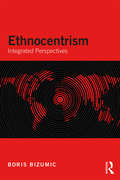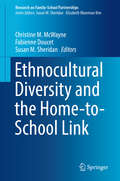- Table View
- List View
Ethnicity and Empire in Kenya
by Myles OsborneThis book is about the creation and development of ethnic identity among the Kamba. Comprising approximately one-eighth of Kenya s population, the British considered the Kamba East Africa s premier "martial race" by the mid-twentieth century: a people with an apparent aptitude for soldiering. The reputation, indeed, was one that Kamba leaders used to leverage financial rewards from the colonial state. However, beneath this simplistic exterior was a maelstrom of argument and debate. Men and women, young and
Ethnicity and Governance in the Third World (Routledge Revivals)
by Pita Ogaba AgbeseThis title was first published in 2001. Written by an outstanding international group of researchers focusing on ethnic conflict, this refreshing analysis provides practical and effective policy options for the people of the Third World.
Ethnicity and Group Rights: Nomos XXXIX (NOMOS - American Society for Political and Legal Philosophy #12)
by Ian Shapiro, Will KymlickaWithin Western political philosophy, the rights of groups has often been neglected or addressed in only the narrowest fashion. Focusing solely on whether rights are exercised by individuals or groups misses what lies at the heart of ethnocultural conflict, leaving the crucial question unanswered: can the familiar system of common citizenship rights within liberal democracies sufficiently accommodate the legitimate interests of ethnic citizens. Specifically, how does membership in an ethnic group differ from other groups, such as professional, lifestyle, or advocacy groups? How important is ethnicity to personal identity and self-respect, and does accommodating these interests require more than standard citizenship rights? Crucially, what forms of ethnocultural accommodations are consistent with democratic equality, individual freedom, and political stability? Invoking numerous cases studies and addressing the issue of ethnicity from a range of perspectives, Ethnicity and Group Rights seeks to answer these questions.
Ethnicity and Inequality in China (Routledge Research on the Politics and Sociology of China)
by Reza Hasmath Bjö A. Gustafsson Sai DingThis book analyses the behaviour of ethnic minority groups in China using the first comprehensive national dataset dedicated to capturing the socio-economic profile of ethnic minorities: the China Household Ethnicity Survey (CHES). Managing ethnic diversity in China has become an increasingly important subject, especially against the backdrop of the nation’s rampant economic growth and changing institutional behaviour. The book has an analytical interest in looking at the benefactors of China’s growth from an ethnic group dimension, and notably, how the economic life of the 55 ethnic minority groups compares to the Han majority. It’s one of the first publications to capture the heterogeneity of ethnic minority groups’ socio-economic experience, through intersectional analysis and multi-disciplinary approaches. Contributing factors in explaining ethnic minorities’ experiences in the urban labour market are also considered: from how linguistic capital and migration patterns vary for ethnic minorities, to the effects of pro-rural policies. Underpinning these are questions about the extent to which happiness and discrimination impact the economic life of ethnic minorities. Ethnicity and Inequality in China will prove an invaluable resource for students and scholars of economics, sociology and contemporary Chinese Studies more broadly.
Ethnicity and Integration
by John Stillwell Maarten Van HamThe theme of this volume is ethnicity and the implications for integration of our increasingly ethnically diversified population, with topics covering demographics and migration of ethnic groups, measures of integration or segregation, health and labour market characteristics, ethnicity and crime and ethnic population projections.
Ethnicity and Nationalism in Italian Politics: Inventing the Padania: Lega Nord and the Northern Question (Research in Migration and Ethnic Relations Series)
by Margarita Gómez-Reino CachafeiroEmploying primary sources and interviews with protagonists of the rebellion of the Italian North, this book explores the invention of the Padanian nation and the construction of identity politics in Northern Italy. It reveals for the first time the connection between the ethnic wave in European party politics in the 1970s and the rise of a new radical right nationalism in the 1990s. The author highlights the way in which the discourse of national minorities was instrumental in the rise of a new political agenda that links territory, identity and cultural rights to create new boundaries of exclusion. In addition to clarifying the connection between the new nationalism and racism by demonstrating how cultural distinctiveness is constructed in contemporary European politics, this unique book also explores the dynamics of new party mobilization and the symbolic resources of nationalist rhetoric. This book presents for the first time data on political participation - both party elites and members - and the real dimension of the party organization.
Ethnicity and Politics in Southeast Asia (Elements in Politics and Society in Southeast Asia)
by Amy H. Liu Jacob I. RicksWhat explains the treatment of ethnic minorities in Southeast Asia? This Element conceptually disaggregates ethnicity into multiple constituent markers – specifically language, religion, and phenotype. By focusing on the interaction between these three ethnic markers, Liu and Ricks explore how overlap between these markers can affect whether a minority integrates within a broader ethnic identity; successfully extracts accommodation as unique group; or engages in a contentious and potentially violent relationship with the hegemon. The argument is tested through six case studies: (1) ethnic Lao in Thailand: integration; (2) ethnic Chinese in Thailand: integration; (3) ethnic Chinese in Malaysia: accommodation; (4) ethnic Malays in Singapore: accommodation; (5) ethnic Malays in Thailand: contention; and (6) ethnic Chinese in Indonesia: contention.
Ethnicity and Religion: Intersections and Comparisons (ISSN)
by Joseph Ruane and Jennifer ToddReligion has regained political prominence in the twenty first century and not least for the manner in which it intersects with ethnicity. Many ethnic conflicts have a strong religious dimension, and religion appears as a powerful force for mobilisation, solidarity and violence. Religion and ethnicity can each act as a powerful base of identity, group formation and communal conflict. They can also overlap, with ethnic and religious boundaries coinciding, partially or completely, internally nested or intersecting.This volume maps the different forms of intersection: cases where religion is prioritised in private life and ethnicity in public, where each coexists in tension in political life, and where the distinctions reinforce each other with dynamic effects. It maps the different patterns with case studies and comparisons from Ireland, Northern Ireland, France, Zimbabwe, Ghana and Malaysia. It shows how ordinary people construct their solidarities and identities using both ethnic and religious resources. This opens up analysis of the socially transformative, as well as politically antagonistic, potential of religion in situations of ethnic division. This book was published as a special issue of Ethnopolitics.
Ethnicity and Territory in the Former Soviet Union: Regions in Conflict (Routledge Studies in Federalism and Decentralization)
by James Hughes Gwendolyn SasseThe collapse of the Soviet empire in 1991 removed a decades-long system of successful control of potential ethnic and regional conflict . The result was the eruption of numerous conflicts over state-building, some of which degenerated into violence and some of which were resolved or prevented by strategies of accommodation. This volume explores the common trends and differences in the responses of the new post-Soviet states to the problems of state-building in ethnically and regionally divided societies, focusing on the impact of ethnic and regional conflicts on post-communist transition and institutional development. The book will be essential reading for specialists and students alike who are interested in conflict regulation and post-Soviet politics.
Ethnicity and Violence: The Case of Radical Basque Nationalism (Routledge/Canada Blanch Studies on Contemporary Spain)
by Diego MuroThis book provides a genealogy of radical Basque nationalism and the means by which this complex, often violent, political movement has reinforced Basque identity. Radical nationalists are mobilized by a shared frame of reference where ethnicity and violence are intertwined in a nostalgic recreation of a golden age and a quasi-religious imperative to restore that distant past. Muro critically examines the origins of the ethno-nationalist conflict and provides a comprehensive examination of Euskadi Ta Askatusana’s (ETA) violent campaign. The book analyzes the interplay of ethnicity and violence and stresses the role of inherited myths, memories, and cultural symbols to explain the ability of radical Basque nationalism to endure.
Ethnicity and the Persistence of Inequality
by Rosemary Thorp Maritza ParedesUnderstanding why inequality is so great and has persevered for centuries in a number of Latin American countries requires tools that go beyond economics. Investigating the case of Peru, this book explores how inequality is embedded in institutions that constitute the interface between the economy, the polity and geography of the country.
Ethnicity, Authority, and Power in Central Asia: New Games Great and Small (Central Asian Studies)
by Robert L. CanfieldThe peoples of Greater Central Asia – not only Inner Asian states of Soviet Union but also those who share similar heritages in adjacent countries like Afghanistan and Pakistan, Iran, and the Chinese province of Xinjiang – have been drawn into more direct and immediate contact since the Soviet collapse. Infrastructural improvements, and the race by the great powers for access to the region’s vital natural resources, have allowed these peoples to develop closer ties with each other and the wider world, creating new interdependencies, and fresh opportunities for interaction and the exercise of influence. They are being integrated into a new, wider economic and political region which is increasingly significant in world affairs, owing to its strategically central location, and its complex and uncertain politics. However, most of its inhabitants are pre-eminently concerned with familial and local affairs. This work examines the viewpoints and concerns of a selection of groups in terms of four issues: government repression, ethnic group perspectives, devices of mutual support, and informal grounds of authority and influence. Responding to a need for in-depth studies concerning the social structures and practices in the region, the book examines trends and issues from the point of view of scholars who have lived and worked "on the ground" and have sought to understand the conditions and concerns of people in rural as well as urban settings. It provides a distinctive and timely perspective on this vital part of the world.
Ethnicity, Class, and the Indigenous Struggle for Land in Guerrero, Mexico (Native Americans: Interdisciplinary Perspectives)
by Norberto ValdezThis study focuses on Amuzgo Indian communities of the Costa Chica of Guerrero state in Mexico in order to analyze the indigenous struggle for land and its relationship to ethnic identity and culture. Primary archival data and field research reveal a historical profile of this multi-ethnic region with a long and fascinating history of resistance to non-Indian control of communal lands and labor. The dynamics of 19th century liberal economic reforms, privatization of Indian lands, militarization, interventions of foreign capital, class conflicts, and impoverishment are reflected in contemporary processes in the Costa Chica. The image of the resilient peasant, or campesino , masks negative aspects of peasant status in the class structure, including poverty and superexploitation of family labor, and the intra and inter-familial conflicts that are a significant aspect of daily life. Case studies of land conflicts explore these class issues, as well as the relationship between gender inequalities and insecurities of land tenure. Indian communal lands (ejidos ) are more than an economic means of agricultural production; such lands are also the basis of cultural reproduction and provide a framework in which political resistance can emerge. Bibliography. Index
Ethnicity, Commodity, In/Corporation (Framing the Global)
by George Paul Meiu, Jean Comaroff and John L. ComaroffIn the economics of everyday life, even ethnicity has become a potential resource to be tapped, generating new sources of profit and power, new ways of being social, and new visions of the future. Throughout Africa, ethnic corporations have been repurposed to do business in mining or tourism; in the USA, Native American groupings have expanded their involvement in gaming, design, and other industries; and all over the world, the commodification of culture has sown itself deeply into the domains of everything from medicine to fashion. Ethnic groups increasingly seek empowerment by formally incorporating themselves, by deploying their sovereign status for material ends, and by copyrighting their cultural practices as intellectual property. Building on ethnographic case studies from Kenya, Nepal, Peru, Russia, and many other countries, this collection poses the question: Does the turn to the incorporation and commodification of ethnicity really herald a new historical moment in the global politics of identity?
Ethnicity, Democracy and Citizenship in Africa: Political Marginalisation of Kenya's Nubians (Contemporary African Politics)
by Samantha Balaton-ChrimesAs an ethnic minority the Nubians of Kenya are struggling for equal citizenship by asserting themselves as indigenous and autochthonous to Kibera, one of Nairobi’s most notorious slums. Having settled there after being brought by the British colonial authorities from Sudan as soldiers, this appears a peculiar claim to make. It is a claim that illuminates the hierarchical nature of Kenya’s ethnicised citizenship regime and the multi-faceted nature of citizenship itself. This book explores two kinds of citizenship deficits; those experienced by the Nubians in Kenya and, more centrally, those which represent the limits of citizenship theories. The author argues for an understanding of citizenship as made up of multiple component parts: status, rights and membership, which are often disaggregated through time, across geographic spaces and amongst different people. This departure from a unitary language of citizenship allows a novel analysis of the central role of ethnicity in the recognition of political membership and distribution of political goods in Kenya. Such an analysis generates important insights into the risks and possibilities of a relationship between ethnicity and democracy that is of broad, global relevance.
Ethnicity, Equality of Opportunity and the British National Health Service
by David Mason Paul IganskiThis title was first published in 2002: Numerous reports have identified the serious problems of under-representation of, and discrimination against, minority ethnic groups in the British NHS. It is widely argued that this both raises issues of social justice and undermines the quality of service to minority ethnic patients. Nowhere are these problems more acute than among the largest occupational group in the NHS - nurses. This book reports the results of research carried out for the English National Board for Nursing, Midwifery and Health Visiting to evaluate NHS equal opportunities policy. Drawing on additional original research involving interviews with key policy actors, this fascinating book examines the prospects for a national strategy linking the business and justice cases for the delivery of greater equity in employment and service delivery.
Ethnicity, Gender and the Subversion of Nationalism
by Fiona Wilson Bodil Folke FrederiksenThis volume explores the politics of identity by analysing the intersections between ethnicity, gender and nationalism in developing societies. These markers of identity are not understood as constituting essences, but as springing from people's core experiences, yearnings and strategic life plans in a context where resources are scarce. As such, identities may be, and are, contested. The intersections are traced across three areas: social and cultural reproduction; ideologies, stereotypes and practices; and nationalist politics and discourse which has tended to remove women from the public arena and construct an ideal of women's domesticity.
Ethnicity, Integration And The Military
by Henry DietzThis book examines the role of the military in encouraging or impeding social integration and the ways in which the military enter into ethnic cleavages and conflicts. It offers some conclusions concerning these and related topics based on studies of a variety of countries including the United States, Israel, Greece, Turkey, Ethiopia, Nigeria, India and the People's Republic of China. Each chapter utilizes a common framework of questions as a basis for analysis, facilitating cross-national comparisons. This book should prove of interest to students and observers of militaries around the world as well as anyone interested in questions of ethnicity and integration.
Ethnicity, Nationalism and Violence: Conflict Management, Human Rights, and Multilateral Regimes
by Christian P. ScherrerThis title was first published in 2003. Meticulously documenting Intra-state violence and the responses to it from a global perspective, this volume deals with a core element of future global governance within its historical and sociological context. It provides a striking analysis of the prevention of violence and resolving conflict, elaborating on the role that key regional and international organizations (e.g. UN, OSCE, COE, OAU-AU and OSA) have or should have in the prevention of violence and terrorism, as well as in the protection of human and minority rights. The work is an invaluable addition to the collections of scholars and students in the fields of peace and conflict research, international relations, sociology, ethnic studies, international law and development research.
Ethnicity, class and aspiration: Understanding London's new East End
by Tim Butler Chris HamnettEast London has undergone dramatic changes over the last 30 years, primarily as a result of London's large scale de-industrialisation and the rise in its financial sector. Large parts of inner East London remain deprived, but a once overwhelmingly white working class area is now home to a more complex and mobile class and ethnic mix. This topical book focuses on the aspirations of these different groups and the strategies they have pursued about where to live, driven in part by a concern to ensure a good education for their children. The book will be essential reading for students and academics in sociology, urban studies, geography and multicultural studies.
Ethno-Nationalism, Islam and the State in the Caucasus: Post-Soviet Disorder (Central Asian Studies)
by Moshe GammerWith the region of the Caucasus with its ongoing, and even deteriorating, crisis and instability and its strategic and economic importance increasingly at the front of the world's attention, this volume presents and discusses some of the complexities and problems arising in the region such as Islamic terrorists and al-Qaida. Scholars from different disciplines who specialise in the Caucasus analyze key topics such as: discussions of grass root perceptions the influence of informal power structures on ethnic conflicts in the Caucasus Russian policies towards Islam and their destabilising influence the influence of Islamic revival on the legal and social situations nationalism and the revival of pre- and sub-national identities shifts in identity as reflected in demography reasons for the Chechen victory in the first Chechen war the involvement of Islamic volunteers in Chechnya. With the situation in Chechnia likely to spread across the entire North Caucasus, this cutting edge work will be of great value in the near future and will interest political scientists and regional experts of Russia, Central Asia, Caucasus, Middle East and Turkey, as well as NGOs, government agencies and think tanks.
Ethno-Religious Violence in Indonesia: From Soil to God (Routledge Contemporary Southeast Asia Series)
by Chris WilsonEthno-religious violence in Indonesia illustrates in detail how and why previously peaceful religious communities can descend into violent conflict. From 1999 until 2000, the conflict in North Maluku, Indonesia, saw the most intense communal violence of Indonesia’s period of democratization. For almost a year, militias waged a brutal religious war which claimed the lives of almost four thousand lives. The conflict culminated in ethnic cleansing along lines of religious identity, with approximately three hundred thousand people fleeing their homes. Based on detailed research, this book provides an in depth picture of all aspects of this devastating and brutal conflict. It also provides numerous examples of how different conflict theories can be applied in the analysis of real situations of tensions and violence, illustrating the mutually reinforcing nature of mass level sentiment and elite agency, and the rational and emotive influences on those involved. This book will be of interest to researchers in Asian Studies, conflict resolution and religious violence.
Ethno-symbolism and Nationalism: A Cultural Approach
by Anthony D. SmithAnthony D. Smith is Emeritus Professor of Nationalism and Ethnicity at the London School of Economics, and is considered one of the founders of the interdisciplinary field of nationalism studies. Anthony Smith has developed an approach to the study of nations and nationalism called ethno-symbolism, which is concerned with the nature of ethnic groups and nations, and the need to consider their symbolic dimensions. This text provides a concise statement of an ethno-symbolic approach to the study of nations and nationalism and at the same time, embodies a general statement of Anthony Smith’s contribution to this approach and its application to the central issues of nations and nationalism. The text: sets out the theoretical background of the emergence of ethno-symbolism in a sustained and systematic argument explains its analysis of the formation of nations, their persistence and change and the role of nationalism demonstrates that an ethno-symbolic approach provides an important supplement and corrective to past and present intellectual orthodoxies in the field and addresses the main theoretical criticisms levelled at an ethno-symbolic approach. Drawing together and developing earlier brief resumes of Anthony Smith’s approach, this book represents a summary of the theoretical aspects of his work in the field since l986. It will be useful to students and to all those who are interested in the issues raised by a study of ethnicity, nations and nationalism.
Ethnocentrism: Integrated Perspectives
by Boris Bizumic. Ethnocentrism works to reinvigorate the study of ethnocentrism by reconceptualising ethnocentrism as a social, psychological, and attitudinal construct. Using a broad, multidisciplinary approach to ethnocentrism, the book integrates literature from disciplines such as psychology, political science, sociology, anthropology, biology, and marketing studies to create a novel reorganisation of the existing literature, its origins, and its outcomes. Empirical research throughout serves to comprehensively measure the six dimensions of ethnocentrism—devotion, group cohesion, preference, superiority, purity, and exploitativeness—and show how they factor into causes and consequences of ethnocentrism, including personality, values, morality, demographics, political ideology, social factors, prejudice, discrimination, and nationalism. Ethnocentrism is fascinating reading for scholars, researchers, and students in psychology, sociology, and political science.
Ethnocultural Diversity and the Home-to-School Link (Research on Family-School Partnerships)
by Susan M. Sheridan Christine M. McWayne Fabienne DoucetThis book explores family-school partnerships and how they can be most effectively leveraged to ensure academic success for students from socioculturally diverse backgrounds. It presents an innovative framework for building collaborative learning partnerships with culturally diverse families, for improved student achievement and more meaningful ties between schools and their communities. It promotes understanding of familial and communal knowledge and recognizing families’ resilience in addressing academic, social, and linguistic barriers. Chapters reimagine family-school partnerships within a context of shared power and authority, examine a spectrum of interventions that support culture-based modes of learning, and emphasize the potential for transformative learning to occur when students’ out-of-school lives are understood and meaningfully leveraged in school. Chapters also discuss how to foster bridges between parents and teachers, provide teachers with access to the rich cognitive and cultural resources of families, and enable all parties to begin viewing families as truly equal partners in children’s education. The book concludes with a commentary chapter that identifies necessary areas for further research.Topics featured in this volume include:The contribution of racial and ethnic socialization to family-school partnerships during early childhood.Fathers and their role in family-school partnerships.The importance of Indigenous family engagement in systems of education.Home-school partnerships and mixed-status immigrant families in the United States.Family-school partnership research with the migrant and seasonal farm working community.The role of humility in working with families across international contexts.Interventions that promote home-to-school links.Ethnocultural Diversity and the Home-to-School Link is a must-have resource for researchers, professionals, and graduate students in education, child and school psychology, educational policy and politics, family studies, developmental psychology, sociology of education, and anthropology.

